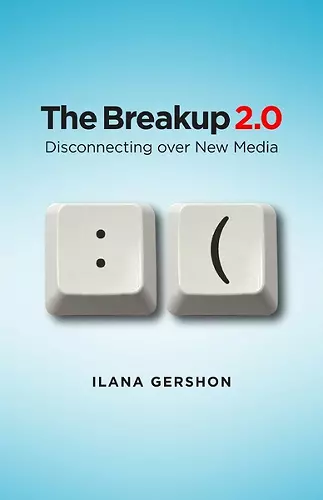The Breakup 2.0
Disconnecting over New Media
Format:Hardback
Publisher:Cornell University Press
Published:15th Aug '10
Currently unavailable, and unfortunately no date known when it will be back
This hardback is available in another edition too:
- Paperback£19.99(9780801477898)

A few generations ago, college students showed their romantic commitments by exchanging special objects: rings, pins, varsity letter jackets. Pins and rings were handy, telling everyone in local communities that you were spoken for, and when you broke up, the absence of a ring let everyone know you were available again. Is being Facebook official really more complicated, or are status updates just a new version of these old tokens?
Many people are now fascinated by how new media has affected the intricacies of relationships and their dissolution. People often talk about Facebook and Twitter as platforms that have led to a seismic shift in transparency and (over)sharing. What are the new rules for breaking up? These rules are argued over and mocked in venues from the New York Times to lamebook.com, but well-thought-out and informed considerations of the topic are rare.
Ilana Gershon was intrigued by the degree to which her students used new media to communicate important romantic information—such as "it's over." She decided to get to the bottom of the matter by interviewing seventy-two people about how they use Skype, texting, voice mail, instant messaging, Facebook, and cream stationery to end relationships. She opens up the world of romance as it is conducted in a digital milieu, offering insights into the ways in which different media influence behavior, beliefs, and social mores.
Above all, this full-fledged ethnography of Facebook and other new tools is about technology and communication, but it also tells the reader a great deal about what college students expect from each other when breaking up—and from their friends who are the spectators or witnesses to the ebb and flow of their relationships. The Breakup 2.0 is accessible and riveting.
Breaking up is hard to do, and, as Ilana Gershon observes, it can be even harder when technology is brought into the mix. Gershon interviewed over 70 people (many of them college students) to examine how they used chatting, email, texting, and social networking websites in conjunction with their relationships and found that opinions and social rules governing the intersection of romance and technology are still highly variable. Why would some people rather break up through email, while others prefer instant messaging? What kind of problems arise when a couple has different ideas about how to digitally negotiate the end of their relationship? How do the social and public aspects of sites like Facebook affect one's actions during a relationship and after its dissolution? Mindful of the complicated nature of the topic, Gershon never attempts to define which behaviors are right or wrong but instead concentrates on exploring the ways people think about these tools and what their beliefs show about society's responses to technology. Though written with an academic focus, this is an intriguing read for anyone interested in how social conventions for new media develop and the ways that technology is changing romantic relationships.
* Library Journal *In her surprisingly gripping first book, Gershon argues that Facebook and other forms of new media social networking have radically changed the playing field of accepted interactions. Generations navigate these new forms differently and a whole new set of norms is being developed to judge behavior. No subject has dominated the discussion more than the ways in which we handle romantic relationships: when they begin, when to go public, and how to bring them to an end. Do people really break up via text message? The answer is yes, and Gershon asserts that in this case 'the medium is at odds with the message.' A professor of communications, the author takes a distinctly academic approach, lending legitimacy to what might otherwise be easily dismissed. She understands how new media shapes social communications and addresses its constant evolution. Readers interested in communication theory and new media evolution will appreciate the author's excellent balance of analysis, anecdote, and readability.
* Publishers WeekISBN: 9780801448591
Dimensions: 216mm x 140mm x 22mm
Weight: 454g
224 pages